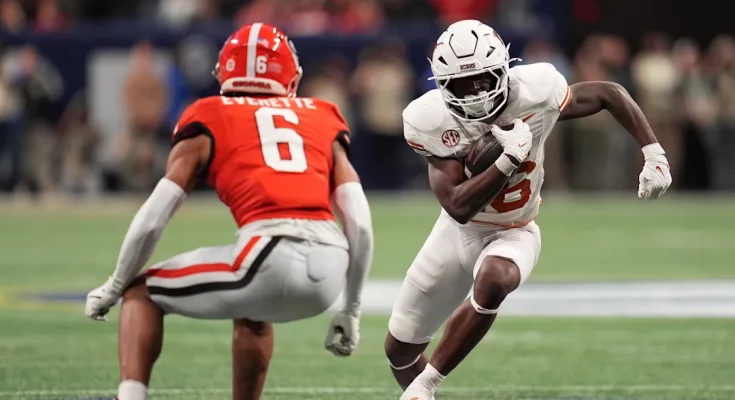When the Texas Longhorns officially joined the SEC, college football fans across the country braced for a seismic shift in rivalries, traditions, and competitive landscapes. Longhorn fans already had decades of history with programs like Oklahoma and Texas A\&M, but their move into the Southeastern Conference opened the door for new narratives to be written. As the dust begins to settle, one emerging storyline has captured the attention of media and fans alike: a budding rivalry between the Texas Longhorns and the Georgia Bulldogs. What initially looked like just another high-profile matchup on the calendar now appears to have the early signs of something more—a potential new SEC heavyweight rivalry built on talent, tension, and tradition.
The very idea of Texas and Georgia locking horns regularly would have seemed far-fetched a decade ago. Separated by geography and conference affiliation, the two programs had little reason to interact beyond the occasional bowl game. But with Texas now part of the SEC, regular-season showdowns and championship implications are inevitable. The timing couldn’t be more perfect. Both teams are national contenders with top-tier recruiting pipelines, elite coaching staffs, and massive fanbases. And both programs are not only proud but fiercely protective of their football identity. The combination of high stakes, regional pride, and a hunger for dominance is exactly what gives birth to college football’s greatest rivalries.
The seeds for this rivalry may have been planted years ago, but they began sprouting in earnest in the lead-up to the 2024 season when both teams began to circle each other in recruiting battles. High school stars from across the South—players who once only had eyes for Alabama, LSU, or Florida—started receiving aggressive pitches from both Athens and Austin. Suddenly, 5-star linebackers in Georgia were visiting the Forty Acres, while blue-chip receivers in Texas were making official visits to Sanford Stadium. The battles for talent have become intense, personal, and symbolic. Texas and Georgia aren’t just trying to win football games—they’re trying to steal each other’s future.
When the two teams met in the College Football Playoff semifinal, all of that tension came to a head. It was the kind of game that doesn’t just crown a victor but establishes pecking orders. The stadium was packed, the fans were rowdy, and the players knew what was on the line: not just a spot in the national title game, but bragging rights that could echo through recruiting circles and message boards for years to come. Georgia had entered as the defending champions, the gold standard of the SEC under Kirby Smart. Texas, meanwhile, was the newcomer trying to make a statement. Though Georgia came out on top in a close and bruising battle, Texas left the field with more than just respect—they left with resentment. And resentment is the fuel that turns matchups into rivalries.
What makes this particular potential rivalry so compelling is that it doesn’t feel forced. Unlike some conference realignment matchups that seem born more from TV deals than from actual football stakes, Texas vs. Georgia already has natural friction. Both schools are flagship universities in large, football-crazed states. Both boast massive alumni networks and blue-blood traditions. Both have chip-on-the-shoulder mentalities—Georgia, after being overlooked for years behind Alabama, and Texas, after enduring a decade of national irrelevance. They are mirror images of ambition and pride. That kind of mutual intensity isn’t something you can manufacture.
The coaches are central figures in this emerging rivalry. Kirby Smart has established himself as one of the premier tacticians in the sport, building a defense-first powerhouse that’s churned out NFL talent at a record pace. Steve Sarkisian, on the other hand, has revitalized Texas with his offensive acumen and relentless recruiting. The contrast in styles adds flavor to the matchup. When Sarkisian’s creative schemes go head-to-head with Smart’s impenetrable defenses, it feels like a battle of ideologies as much as it is a contest between teams. And given how active both coaches are in the recruiting sphere, their battles off the field are just as fierce as those on Saturdays.
Fan culture also plays a role. Georgia fans have developed a reputation for traveling in droves and packing out any stadium they enter, while Texas fans have long claimed the title of being among the most passionate and loyal in the country. When the two fanbases clash, it’s more than just football—it’s a cultural collision. Social media erupts, tailgates turn into battlegrounds of pride, and the air buzzes with SEC bravado. Georgia fans look down on Texas as outsiders trying to prove they belong. Texas fans see Georgia as the entrenched power trying to bully the new kid on the block. Both sides see each other as threats, and that perception is the spark that could ignite something enduring.
It’s important to note that this potential rivalry doesn’t have the decades of history that other SEC matchups enjoy. There’s no equivalent of the Iron Bowl or the Cocktail Party yet. But rivalries have to start somewhere, and all the ingredients are in place. If Texas continues to rise and Georgia remains elite, their paths will cross again in the playoff picture, in the SEC Championship Game, and in high-stakes regular-season matchups. Every game will add another chapter, another highlight, another reason for fans to circle the date on the calendar.
There’s also a sense that both programs know what’s at stake. For Georgia, maintaining dominance means fending off the new challengers to the throne. For Texas, climbing to the top of the SEC requires slaying giants—and Georgia is as big as they come. The more they play, the more the players will remember hits, taunts, celebrations, and heartbreaks. Soon, memories will turn into motivation, and that motivation becomes tradition.
Interestingly, there’s also mutual respect buried under the competitive fire. Texas coaches often cite Georgia as the blueprint for how to build a modern championship program. Georgia, meanwhile, acknowledges that Texas is one of the few programs with the resources and brand power to match their own. That respect doesn’t dull the rivalry—it enhances it. It gives the games a layer of significance beyond the scoreboard. When Georgia lines up against Texas, they know they’re not just facing a tough opponent—they’re facing a program that sees them as the standard to surpass. And Texas knows that beating Georgia is the fastest way to prove that they’re back for real.
As the SEC calendar begins to reflect the new conference makeup, all eyes will be on the games that carry weight—not just in the standings, but in the stories fans tell. If Texas and Georgia continue to meet in pivotal moments, the emotions from those games will create a gravitational pull that rivals Alabama–Auburn or LSU–Florida. It won’t happen overnight. Rivalries need heat, time, and repetition. But this one has already shown flashes of what it could be, and if the early signs are any indication, we may be witnessing the birth of college football’s next marquee SEC feud.
For college football purists, the rise of Texas vs. Georgia is a welcome development in an era of change. Realignment has scattered some traditions, but it has also opened the door for new ones. And few matchups carry the promise, the prestige, and the potential bad blood that this one does. If future meetings match the intensity of their early showdowns, then Texas and Georgia may not just be new SEC opponents—they might be each other’s biggest obstacle, biggest measuring stick, and biggest source of annual drama.
In a sport where emotion drives everything, from recruiting pitches to championship parades, rivalries are the heartbeat. And while the history books haven’t yet etched Texas vs. Georgia in the same ink as Alabama–Tennessee or Florida–Georgia, the pen is in motion. With every tackle, every touchdown, and every controversial call, a new rivalry is being written—not by tradition, but by intensity. And if the fireworks we’ve seen so far are any clue, the Texas Longhorns and Georgia Bulldogs are just getting started.



